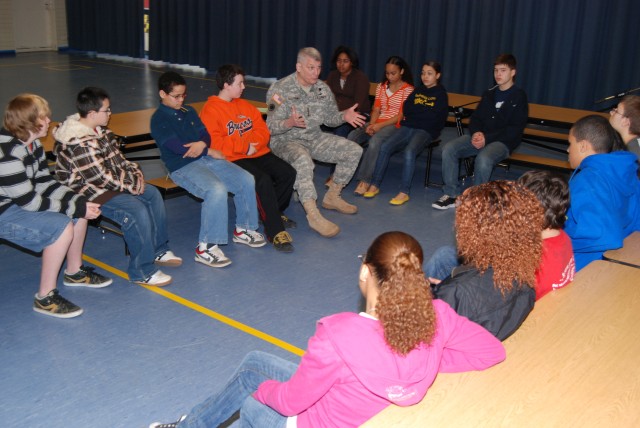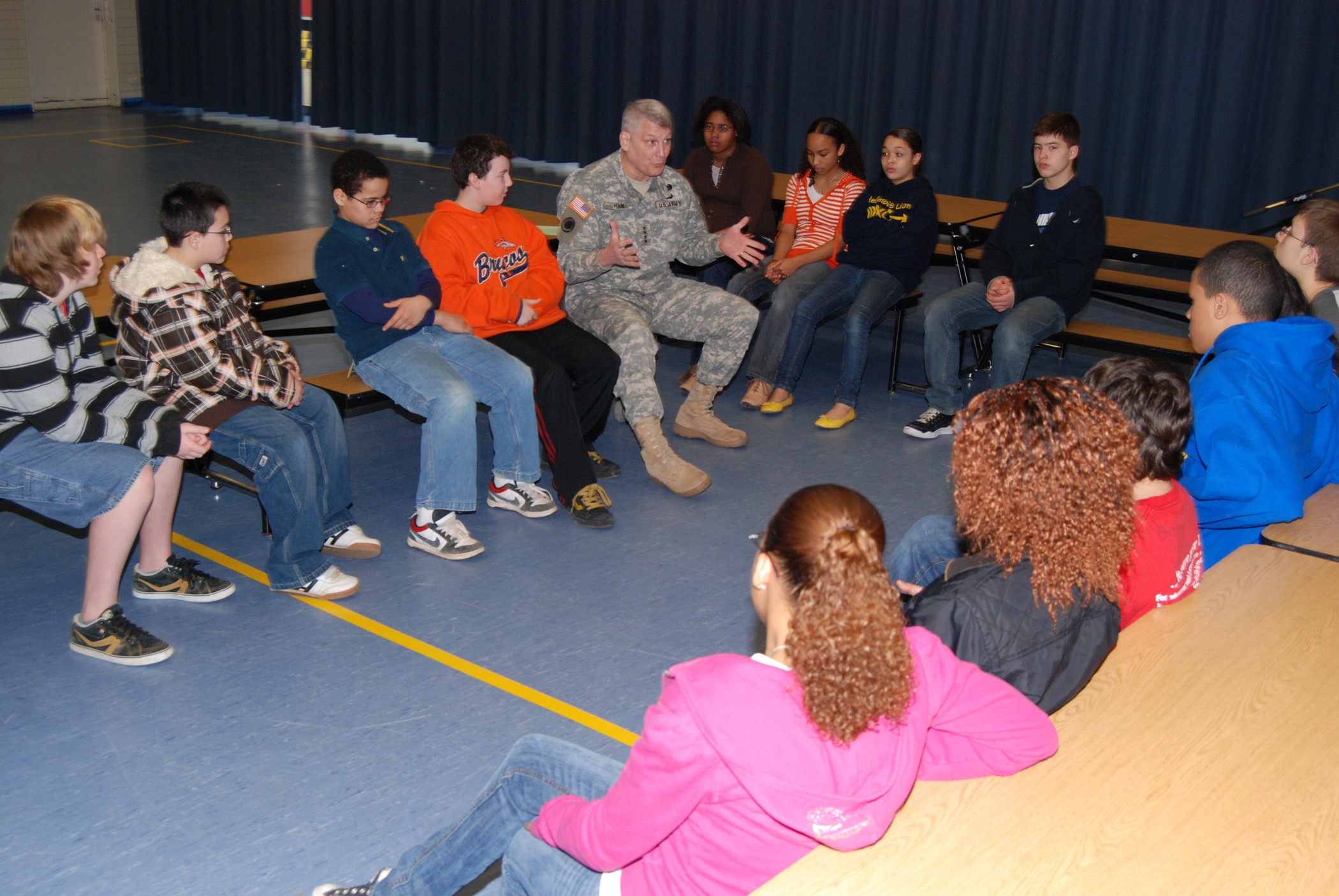
HEIDELBERG, Germany -- A group of Heidelberg Middle School students told U.S. Army Europe commander Gen. Carter F. Ham they want to spend as much time as they can with their Soldier-parents before deployments.
Ham spent about an hour with a group of 28 students talking with about deployments, community, school, recreation and services during an informal meeting Monday held in the school's multipurpose room Feb. 23.
"You are group of people I do not often get to hear from," Ham said as he opened his conversation with the 6th, 7th and 8th graders. "Your voices are important to me. It is very useful to me to hear from you because your voices are not ones that I hear day and day out."
Ham said he travels around the command meeting with Soldiers, civilian employees and other adult groups, but meeting with students is rare. However, he said he has been adding meetings with high school and middle school students because he wants to hear from students about what they think is working well, what needs to be improved, and what programs they like and do not like.
Eighth grader Hannah Shumway had just one request for the general: help families spend more time together before deployment without intrusions from deploying parents' units or workplaces.
"He might help us get more time with our dads or moms; just a week where (our parents) do not have to spend time in the office and they are not getting constant phone calls or e-mails," Shumway said.
"You're looking for some time -- some protected time -- to be at home or just to be with them before they go," Ham responded. "We will do the best we can to make sure there is some predictability, to protect some time for you to do those family activities that are so necessary."
"I can't promise that you'll see changes tomorrow, but I can promise that your comments to me make a lot of sense and we'll make sure that we get programs in place that will protect that very special time for your moms and dads before they go," Ham said.
After the first few questions, the meeting turned from a question-and-answer session into a conversation between the general and the students.
By a show of hands, the students told Ham many of them had parents who are deployed or recently returned from deployment. A few students have experienced the deployment of both parents.
"The first few months are hard," one boy said. "There is someone in your life that's usually (there), who isn't. But after you're used to them being gone, they come home and it's pretty weird."
Ham told the students it's normal for children and parents to change over the course of a deployment, and that it takes time for families to reestablish relationships and routines when their Soldiers come home.
"We all accept that the Soldiers will be a little bit different because they've been through a different experience." Ham said. "What we forget sometimes is that we change, too. You're a year older, so you've grown as well. These deployments affect each of us differently."
The general asked the students if services at their school, churches or in the community helped them prepare for and deal with deployment, and who they rely upon during the "really bad days of a deployment." Many said they found support through those formal channels, but also relied upon each other, their families and pets.
"Nobody understands what it is like to have a parent deployed better than you do," Ham agreed. "As hard as I might try or as hard as others might try, it is not the same for us. We are not in your shoes. I am really encouraged hearing that you are taking care of each other."
The students told Ham they believe many school counselors and teachers -- particularly those whose spouses have deployed -- understand what it is like to have a deployed parent, but that some school officials may not understand military life.
"I want to make sure that you have the people and the services available to you if you want them," Ham said. "I want to make sure you have folks that you can talk to and that you can do so anonymously if you like to."
When Ham quizzed the students about their parents' rest and recuperation leave, services offered at the Armed Forces Recreation Center in Garmisch, Germany and other family leave activities, many said they enjoyed those programs, but had problems with the unpredictability of their parents' arrival for the two weeks of R&R leave.
"We try very hard to predict when Soldiers are able to come home on their leave," Ham said. "You all understand it is going to move a little bit because of airplane availability and weather."
Sports, clubs and teen centers were named as top choices for local activities, while longer recesses and swimming pools were high on the students' wish lists. A suggestion asking for school field trips drew some applause.
Several students said they appreciated that the general took the time to meet with them and listen to their concerns.
"I really like that Gen. Ham actually came out, because he really does not have to. It actually shows that he does care," said 8th grader Alex Carlos. "He does want to make a difference."
Justin Collier said he was impressed with the general's questions.
"He actually listened to what we had to say, and you could tell that he was paying attention to what we meant," the 8th grader said.

Social Sharing